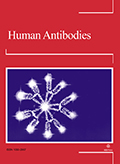Authors: Ditzel, Henrik | Erb, Karin | Leslie, Graham | Jensenius, Jens Chr.
Article Type:
Research Article
Abstract:
The large size of human IgM monoclonal antibodies (MAbs) may impede the tumor-localizing capacity. A procedure is described for the preparation of antigen-binding monomeric (IgMm ) and half-monomeric (IgMI½m fragments from two human IgM MAbs, COU-1 and D4213. The fragments retained binding activity against colon carcinoma. Six different reducing reagents (dithiotreitol, 2-mercaptoethanol, 2-mercaptoethylamine, L-cysteine, metabisulphite, ascorbic acid) were investigated over a range of concentrations, pHs, and incubation periods. The reduced IgM preparations were alkylated with iodoacetamide and fractionated by high-performance gel permeation chromatography. The fractions were directly collected on ELISA plates coated with extracts of colon cancer cells. Antigen-binding
…IgMm and IgMI½m fragments were obtained after treatment with mercaptoethanol, mercaptoethylamine, metabisulphite, and cysteine. IgMm and IgMI½m fragments were also obtained after dithiotreitol treatment. These fragments were, however, nonreactive. The pH during the reduction was important for optimal yields of the fragments. The fragments obtained with 2-mercaptoethanol and mercaptoethylamine were most effective in binding to the cancer cell extract. The association constants per binding site for intact, monomeric, and half-monomeric COU-1 were by competitive inhibition assays estimated at 1.5 × 108 M−1 , 3.1 × 108 M−l and 4.0 × 106 M−1 , respectively. The reduction of human IgM MAbs to IgMm and IgMI½m fragments may facilitate the tumor localization when these are used in the diagnosis and therapy of cancer patients.
Show more
Keywords: human monoclonal antibody, fragment, monomeric, half-monomeric, antigen-binding, colorectal cancer
DOI: 10.3233/HAB-1993-4207
Citation: Human Antibodies,
vol. 4, no. 2, pp. 86-93, 1993
Price: EUR 27.50





